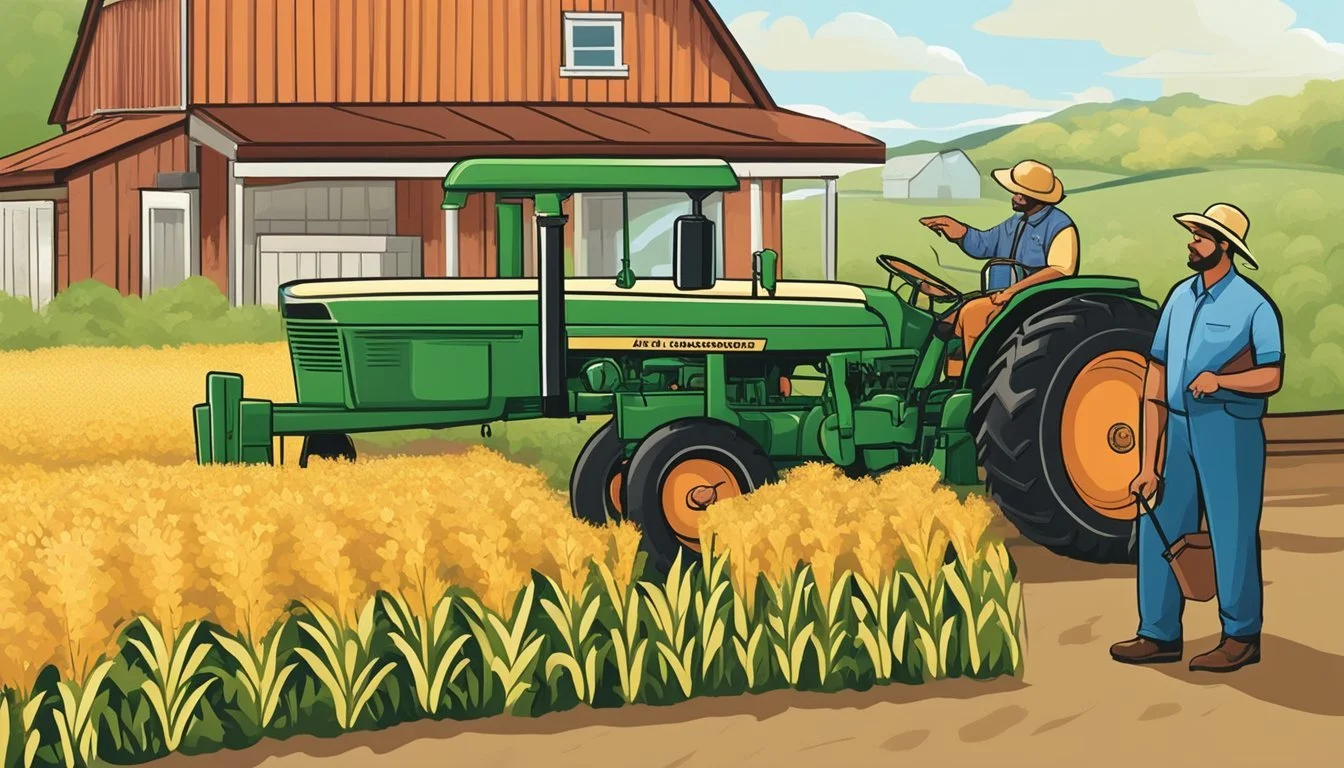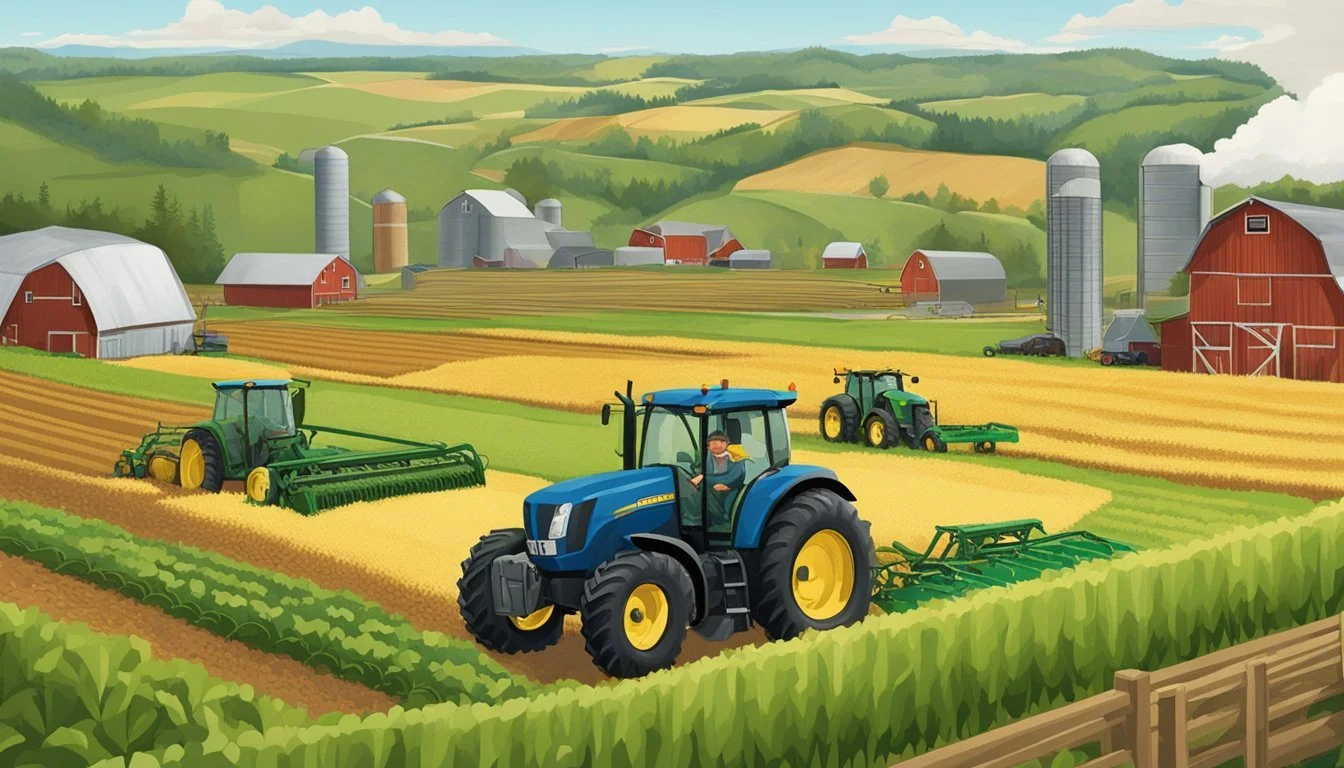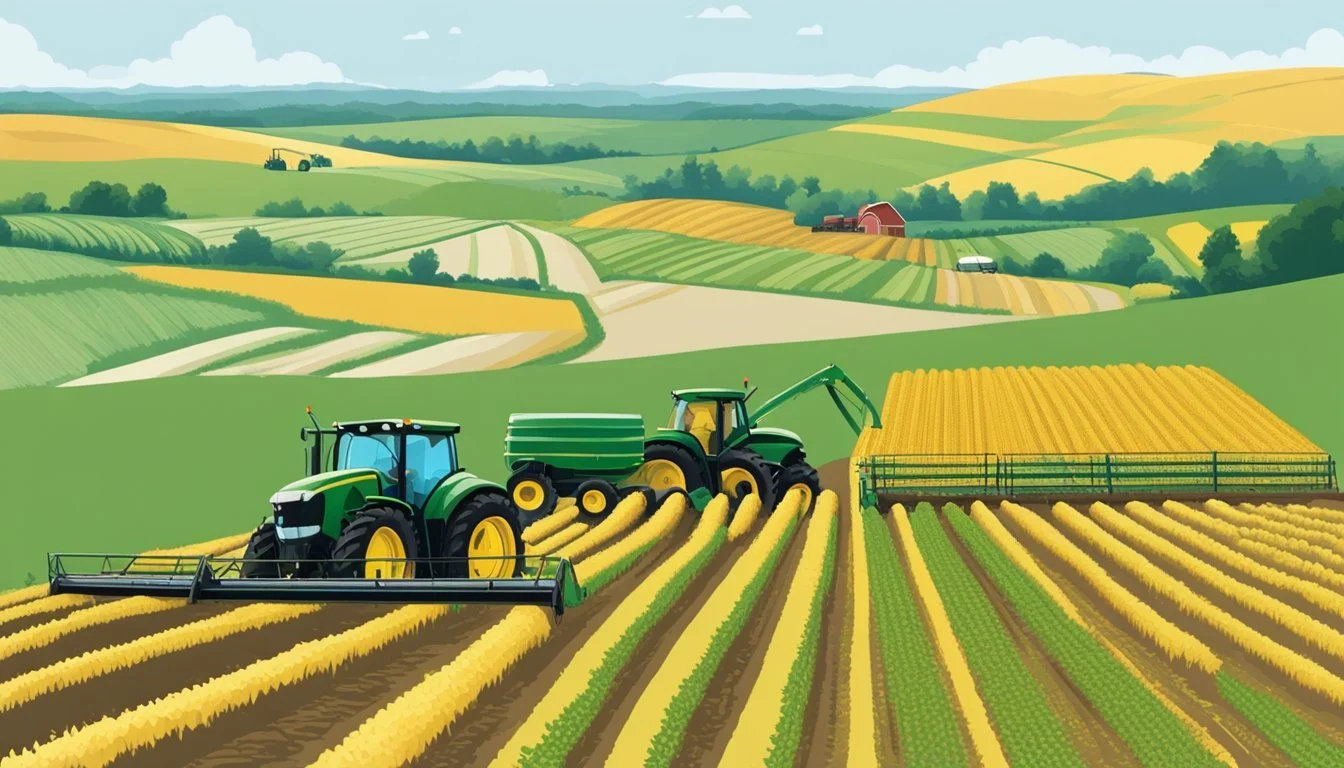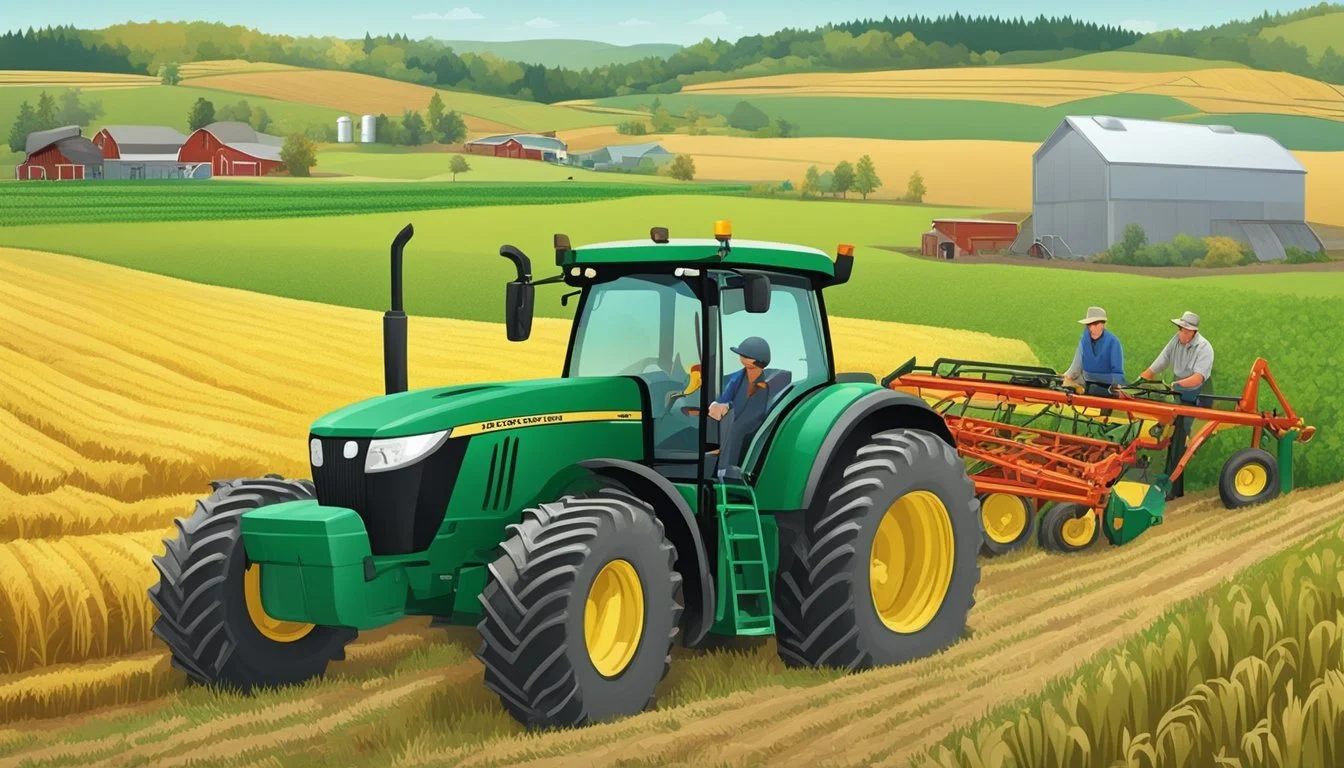Farming Grants Washington
Opportunities for Agricultural Funding
Farmers in Washington State have access to various grant opportunities that aim to support and develop the agriculture sector. These financial resources are designed to help farming businesses thrive by enhancing market prospects, enabling research, and improving agricultural practices. Entities like the Washington State Department of Agriculture (WSDA) administer programs funded by the USDA, such as the Specialty Crop Block Grants, which focus on fostering the growth of specialty crops within the state.
In addition to state-level grants, the USDA Farm Service Agency implements programs like the Conservation Reserve Enhancement Program (CREP) to assist in environmental conservation efforts on agricultural land. This particular program encourages producers to convert sensitive land into conservation reserves, which plays a crucial role in erosion control, wildlife habitat restoration, and the protection of water sources.
Availability of information and resources for Washington farmers looking for grants is extensive. Programs such as the Washington State University's Regional Small Farms program and the USDA's Beginning Farmer and Rancher Development Program (BFRDP) provide critical assistance. These include education, technical support, and mentoring catered specifically for new farmers and ranchers. These initiatives are instrumental in ensuring the long-term sustainability and success of the agricultural industry in the state of Washington.
Overview of Farming Grants in Washington
In Washington, farming grants play a vital role in promoting sustainable agricultural practices, enhancing economic viability of farms, and bolstering local food communities. They offer crucial support for a range of activities from market expansion to infrastructure improvements.
Types of Farming Grants
Specialty Crop Block Grants: These aim to support the growth and marketing of specialty crops through research and infrastructure enhancement.
LFSI Grants: The Local Food System Infrastructure (LFSI) grants focus on post-harvest infrastructure improvements, market access, and related operating costs.
Farmers Market and Local Food Promotion Program: Includes grants like:
The Farmers Market Promotion Program (FMPP) to enhance direct producer-to-consumer markets.
Local Food Promotion Program Grants (LFPP) for organizations to improve local food systems.
Rural Cooperative Development Grant Program: This program supports the improvement of rural cooperatives with a cap of $200,000 per grant and is available to nonprofit corporations and higher education institutions.
Importance for Local Farmers and Communities
Grants are a lifeline for local farmers, enabling them to:
Purchase Essential Equipment: Such as trucks for transportation of goods to markets and food banks.
Facility Improvements: Expanding or enhancing farm facilities for better food safety and operational efficiency.
Communities benefit through:
Economic Support: Grants offer financial aid that sustains farms and contributes to the local economy.
Access to Local Food: Improved market opportunities and distribution channels ensure the availability of locally grown produce.
By providing a mix of financial support for market development, research, and agricultural best practices, farming grants in Washington state are a foundation for the sustainability and growth of the farming sector and its communities.
Eligibility Requirements for Grants
When seeking farming grants in Washington, it's important to understand the specific criteria and application process established by entities such as the Washington State Department of Agriculture and various USDA-funded programs. These requirements are in place to ensure that only qualified farms and ranchers receive funding to support agricultural best practices and market development.
Criteria for Farms and Ranchers
Eligibility for grants typically requires that applicants be actively engaged in agricultural production. This may include small or large-scale farms, organic operations, and ranches focused on livestock. Criteria to consider:
Ownership: The farm or ranch must be owned and operated by the applicant.
Type: Must be involved in the production of crops, dairy, livestock, poultry, fish, or other agriculture-related sectors.
Size: Both small and large-scale operations may be eligible, with some grants specifically targeting small-scale or family-owned farms.
Specialty: Specific programs might cater to specialty crops or organic farming, aligning with environmental and sustainability goals.
For USDA-funded grants like the Specialty Crop Block Grants and EQIP Organic Initiative, additional USDA-specific criteria must be met.
Understanding the Application Process
The application process is multifaceted and must be approached methodically to ensure compliance and improve chances of success. Key components include:
Deadlines: Pay close attention to application deadlines; late submissions are typically not considered.
Guidelines: Always review the official grant guidelines to align with the funding objectives and legal requirements.
Documentation: Prepare necessary documentation, which may include proof of farm ownership, detailed project proposals, and budget plans.
Assistance: Utilizing available resources and advisories from local agricultural extension services can greatly aid in the application process.
Applicants must keep in mind that the information provided must be accurate and truthful, and it must align with the specific grant's focus area, be it market access improvement, food system infrastructure, or sustainable practices.
Key Grant Programs in Washington
Washington State offers a variety of grant programs catering to the agricultural sector. These programs support market development, research, and the implementation of sustainable practices to benefit local farmers and the state's agricultural industry.
USDA Grants and Farm Service Agency (FSA) Programs
The United States Department of Agriculture (USDA) administers comprehensive grant programs and the Farm Service Agency (FSA) offers support to local farmers. They deliver financial assistance for market expansion and research to improve agricultural practices. Among these are the Specialty Crop Block Grants, tailored to enhance the competitiveness of specialty crops.
USDA Grants: Support a range of agricultural activities including research, market development, and infrastructure improvements.
FSA Programs: Provide loans, disaster relief, and conservation support to farmers and ranchers.
State and Local Government Funding Opportunities
State agencies play a significant role in funding agriculture in Washington State. Programs like the Local Food System Infrastructure Grant show the state legislature's commitment, allocating $5.6 million in state general funds to enhance local food systems. Moreover, one-time federal funds have also contributed to this initiative.
State Agencies: Offer grants such as the Sustainable Farms and Fields (SFF) to facilitate climate-smart agricultural practices.
Counties, Cities, and Towns: May have additional, localized grant opportunities to support their community-specific agricultural needs.
Private and Non-Profit Grant Sources
Aside from government-funded programs, private and non-profit organizations also contribute significantly to Washington's agricultural funding landscape. These entities focus on specific aspects of farming, such as innovation, sustainability, and education for new farmers.
Private Funding: Can come from corporations or family foundations with an interest in agricultural development.
Non-Profit: Entities such as Washington State University's Regional Small Farms program offer guidance and resource links for USDA grants, including those focused on beginning farmers and ranchers.
Application and Funding Process
This section outlines the necessary steps and considerations for applying to farming grants in Washington State. These include preparing an application, understanding the submission timeline and procedures, and effectively managing the funds upon receipt.
Preparing a Grant Application
Applicants must thoroughly research and follow the specific guidelines set forth by the funding agency. Resources, such as the Washington State Department of Agriculture, provide detailed instructions for programs like the Specialty Crop Block Grants. It is essential that applicants maintain clear communication with agencies to ensure all application requirements are met and education materials, when available, are utilized.
Documentation: Prepare all necessary documents which typically include a detailed project proposal, budget, and proof of eligibility.
Clarity and Detail: Applications should be written clearly and provide specific details about the project scope and expected outcomes.
Timeline and Procedures for Submission
The application process adheres to a strict timeline that must be observed. Applicants should refer to the official grant program's website for specific deadlines.
Submission Window: Take note of the opening and closing dates for application submission, as these are strictly enforced.
Procedures: Follow the outlined procedures for submitting applications, which may include online portals, mail-in applications, or in-person submissions.
Receiving and Utilizing Funds
Once approved, the funding process typically moves swiftly. Recipients must comply with all outlined conditions when utilizing grants.
Agreement: Grant recipients are required to enter into a formal agreement stipulating use of funds and reporting requirements.
Utilization: Funds must be used in accordance with grant objectives and within the provided timeline, where financial assistance should focus on the enhancement of farming practices or market development.
Grant applicants may find pertinent information on the Washington State Department of Agriculture website or by contacting them directly for guidance on current funding opportunities and assistance through the application process.
Supportive Resources for Applicants
Farmers in Washington seeking grant opportunities have access to various resources designed to enhance their capability in grant writing and application. These resources provide substantial education and training, as well as access to technical assistance and expertise essential for navigating the intricacies of grant programs.
Education and Training for Grant Writing
Washington State University (WSU), through its Regional Small Farms program, offers educational resources that are instrumental for farmers. Prospective applicants can gain critical skills in grant writing, preparing them to create more compelling and effective grant proposals. Training sessions and workshops are frequently hosted to ensure that farmers have the most current information and strategies at their disposal.
Technical Assistance and Expertise
The Washington State Department of Agriculture (WSDA) not only administers grant programs but also provides significant technical assistance to support farmers. They have experts on staff who can offer guidance on market building, research, and the improvement of agricultural practices. Outreach programs initiated by WSDA aim to ensure that farmers can access the information and technical expertise they need to make informed decisions about grant applications and farm management. Additionally, the USDA Farm Service Agency provides multiple Conservation Reserve Programs that come with robust technical assistance for land conservation practices.
Agricultural Advancements and Sustainable Practices
In Washington State, a dedicated focus on innovative agricultural methods and sustainable initiatives is shaping the future of farming. These practices prioritize soil health, environmental sustainability, and offer robust responses to climate change.
Innovative Agricultural Practices and Research
The state endorses multiple grant programs aimed at elevating innovative agricultural practices and research. The Washington State Department of Agriculture offers grants to support small and mid-sized producers, fostering advancements in domestic food and farming businesses. These initiatives often include research in soil health optimization, the use of cover crops, and composting techniques. By funding these areas, the state encourages farmers to explore new methods that have the potential to revolutionize agricultural practices.
Promoting Sustainable and Organic Farming
Washington is also a forerunner in promoting sustainable and organic farming through various grant programs. The Sustainable Farms and Fields (SFF) initiative is one such program, which incentivizes climate-smart agriculture to increase carbon sequestration and reduce greenhouse gas emissions. Further, the Washington State Organic & Sustainable Farming Fund specifically targets support for organic and regenerative agriculture projects that mitigate climate change and enhance environmental sustainability. These efforts align with grants offered by the Sustainable Agriculture Research & Education (SARE) program, which since 1988 has backed innovations in sustainable agriculture.
Economic Development and Expansion
In Washington State, economic expansion within the farming sector is heavily supported through various grants aimed at enhancing access to markets and driving job creation. These grants bolster economic viability and facilitate business growth by providing resources for value-added activities and rural business development.
Access to Markets and Value-Added Activities
Grants such as the Specialty Crop Block Grants provide vital funding for farmers aiming to access broader markets. These initiatives allow for product differentiation and add value through processing or packaging, which can considerably increase farm income. For example, converting fruits into jams or marketing organic crops can tap into niche markets. This accessibility is crucial for the expansion of farming operations, enabling them to reach consumers efficiently and effectively.
Job Creation and Rural Business Development
The Rural Business Development Grants focus on supporting the economic prosperity of rural areas. Business expansion often goes hand-in-hand with job creation, and these grants aim to enhance the overall business environment in rural Washington. With maximum grant amounts potentially reaching $300,000, these funds can be pivotal for small and emerging private businesses. Allocations can be used to develop new markets for agricultural products, ultimately leading to more robust job opportunities within the farming sector and allied industries.
Special Programs and Grant Opportunities
In Washington State, a variety of grant programs offer support to enhance agricultural practices, develop markets, and implement sustainable farming efforts. These dedicated funds facilitate growth and innovation for farmers and agricultural organizations.
Beginning Farmer and Rancher Development Program (BFRDP)
The Beginning Farmer and Rancher Development Program targets organizations by providing needed resources to help new farmers and ranchers start their ventures. This program, managed by the National Institute of Food and Agriculture (NIFA) of the USDA, supports those who are just entering the agriculture industry in Washington State through education, mentoring, and technical assistance initiatives.
Specialty Crop Block Grant Program
The Specialty Crop Block Grant Program is designed to boost the market opportunities for specialty crops. The Washington State Department of Agriculture administers this USDA-funded program, assisting producers in research, market development, and expanding practices that increase competitiveness of specialty crops. Specialty crops include fruits and vegetables, tree nuts (how long do nuts last?), dried fruits, and horticulture and nursery crops, including floriculture.
Value-Added Producer Grant (VAPG) and Local Food Systems
The Value-Added Producer Grant (VAPG) aims to help agricultural producers enter into value-added activities related to the processing and/or marketing of bio-based, value-added products. Grants can be used for planning activities or for working capital expenses such as processing costs, marketing and advertising expenses, and some inventory and salary expenses.
Local food systems are bolstered by such initiatives as well, which can encompass farm-to-table programs, local farmers' markets, and distribution of local produce to communities. Entities like Tilth Alliance are instrumental in supporting sustainable agriculture and local food systems through various educational and advocacy efforts. Sustainable Agriculture Research and Education (SARE) also contributes by funding projects that promote sustainable farming practices and systems.
Community and Social Impact
The section examines the role of farming grants in Washington in fostering community development and addressing social issues. Grants support initiatives aimed at improving local food access and emphasizing sustainable practices with positive social outcomes.
Enhancing Local Food Access and Nutrition
Community Food Projects (CFP) in Washington State aim to increase food security in low-income communities by building self-reliance and encouraging local food production. Grants underpin these projects, allowing for expanded access to nutritious and healthy food. They facilitate the creation of systems that bring fresh produce directly from farms to consumers, thus enhancing local food access and contributing to the overall health of the community.
National Resources Conservation Service (NRCS): Supports efforts to improve food access through conservation programs that may include elements of food distribution to underserved areas.
Farming with a Focus on Social and Environmental Impact
Farming grants often prioritize projects that demonstrate a commitment to social and environmental responsibilities. Sustainable farming practices such as carbon sequestration are key to Washington State's agricultural grants, reinforcing the idea that farms can mitigate climate change while providing social benefits. Initiatives often include:
Social Impact: Supporting training for sustainable agricultural practices, improving the economic viability of farms, and ensuring fair labor conditions.
Environmental Impact: Encouraging organic farming techniques, which lead to better soil health and lower carbon footprints.
Local entities, like the Tilth Alliance, provide farming grants which emphasize both economic and social impacts, recognizing farms that go beyond food production to also serve as stewards of the land.










